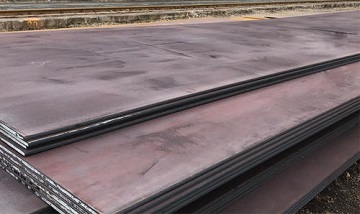Categories
- Pipe & Tube (18)
- Flange & Fitting (97)
- Fastener & Gasket (12)
- Valve & Pump (18)
- Base Material (11)
- Equipment (8)
- Application (30)
- Technical (110)

The ASTM A204 Grade B (C-0.5Mo steel) plates in stock, 6 m x 1.5 m x 26 mm. Manufacturer: Wusteel.
The C-0.5Mo alloy steels refer to a series of carbon-molybdenum low alloy steel grades that contains 0.5% (nominal composition) of molybdenum alloying element. The C-0.5Mo steels are mainly intended for elevated-temperature service, and the carbon content is usually limited to 0.20%; in some classes of tubing for boilers, however, carbon may be as high as 0.35%. The molybdenum addition in amounts of 0.5% increases the resistance of the ferritic steels to deformation at elevated temperature hence improves the creep strength.
The carbon and molybdenum atoms in the C-0.5Mo steel act as interstitial and substitutional solutes respectively during the solid solution process and together contributes to substantial enhancement of creep strength. It is also known as interaction solid-solution strengthening. Meanwhile fine precipitates of Mo2C and Mo2N formed may significantly strengthen the carbon-molybdenum steel. This is known as precipitation strengthening.
The C-0.5Mo steels may be furnished in heat-treated conditions of as-rolled, annealed, normalized, normalized and tempered, stress-relived, depending on specific product forms and purchasers’ requirements. Especially, the use of tempering is an important factor that influences the level of precipitation strengthening and solid-solution strengthening in carbon-molybdenum steel. In a normalized C-0.5Mo steel, the initial contribution from solid-solution strengthening is greater than that of the normalized and tempered steel. In the normalized and tempered C-0.5Mo steel, the initial contribution from precipitation strengthening will be larger than that from the normalized steel. In addition, the precipitation-strengthening effect in the normalized and tempered steel will reach a maximum and begin to decline at an earlier stage due to the earlier incidence of overaging in tempered material. This is a potential consideration in applications requiring creep resistance over long times and at high temperatures.
The C-0.5Mo steels are extensively used in several forms (piping, pressure vessel plates, bolts, structural parts, forgings) in a variety of applications that involve exposure to elevated temperatures. These application include oil & gas industries, fossil-fuel power plants, chemical industries, and petrochemical processing plants, etc.
| Standard & Grade | Product Form |
|---|---|
| ASTM A234/ ASME SA-234 Grade WP1 | seamless & welded pipe fittings |
| ASTM A204/ ASME SA-204 Grade A, B, C | pressure vessel plates |
| ASTM A209/ ASME SA-209 Grade T1, T1a, T1b | seamless boiler and superheater tubes |
| ASTM A250/ ASME SA-250 Grade T1, T1a, T1b | ERW boiler and superheater tubes |
| ASTM A335/ ASME SA-335 Grade P1 | seamless pipes |
| ASTM A369/ ASME SA-369 Grade FP1 | forged pipes |
| ASTM A217/ ASME SA-217 Grade WC1 | castings |
| ASTM A352/ ASME SA-352 Grade LC1 | castings |
| ASTM A672/ ASME SA-672 Grade L65, L70, L75 | EFW pipes |
| ASTM A691/ ASME SA-691 Grade CM-65, CM-70 | EFW Pipes |
| ASTM A336/ ASME SA-336 Grade F1 | forgings |
| ASTM A182/ ASME SA-182 Grade F1 | forgings |
| ASTM A161 Grade T1 | seamless still tubes |
When used in petrochemical operations for continuous service, the suggested maximum temperature based on creep rate of C-0.5Mo steel is 510°C [950°F], while the suggested maximum temperature based on rupture of C-0.5Mo steel is 595°C [1100°F]. Although both Section I and Section VIII of the ASME Boiler & Pressure Vessel Code have defined allowable stresses for C-0.5Mo steel up to 538°C [1000°C], it shall be used for piping and superheater tubes operating at metal temperatures no higher than 455°C [850°F]. Above this temperature, spheroidization and graphitization may increase the possibility of failure in service.
